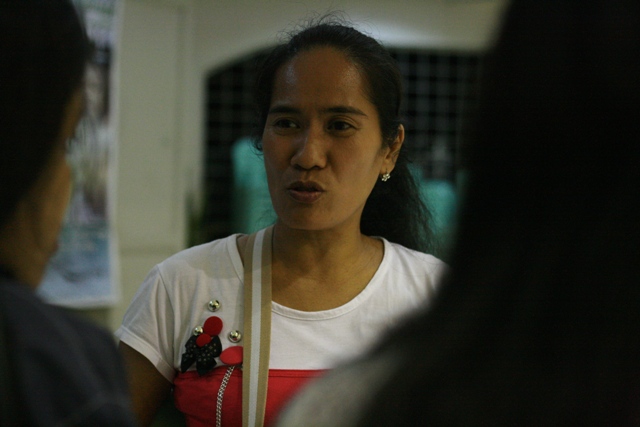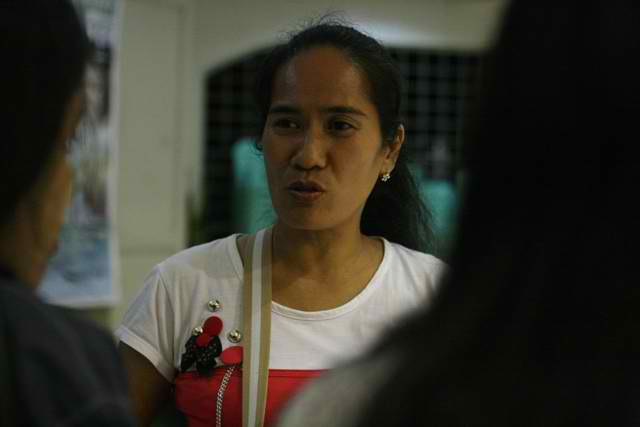By GERMELINA LACORTE
MindaNews and VERA Files

DAVAO CITY — “Until now, I still can’t believe she’s dead,” Evangeline Pitao, the mother of Rebelyn Pitao, says two years after her daughter was abducted and killed. “When I enter her room, I still cry every time I see her ashes.”
Evangeline keeps the ashes near the cabinet that Rebelyn bought with her first pay.
“She used to be so happy with her new cabinet because she used to have only a carton box for her clothes,” Evangeline said. “I still remember her when she kept saying, ‘Ma, I finally have something where to keep my clothes,’ her hands softly touching the cabinet. But she never got to use it for long.”
Days before her death, they were looking forward to her 21st birthday. Evangeline recalled, “I told her, ‘Abe (her nickname for Rebelyn), it’s your birthday on the 20th. What are we going to have?'”
“That would be my payday, Ma,” Rebelyn had replied. “We will buy a gallon of ice cream.” She never got the chance to buy the promised ice cream.
Rebelyn was working as substitute teacher at the St. Peter’s College in Toril in Davao City for about three months when two men seized her from a trisikad on her way home to Bago Gallera on March 4, 2009 and forcibly carried her to a waiting van. Barely 24 hours after, her body was found in a ditch in Carmen town.
The police’s autopsy report showed she was already dead for almost 24 hours when she was found on the evening of March 5, which meant that she could have been killed almost immediately after she was abducted on March 4.
Her eyes were badly bruised and bleeding, her neck showed a 3-cm ligature mark, which meant she could have been strangled; her body bore five stab wounds, two above her left breast, another two below and another one hitting her lungs.
Rebelyn was the daughter of the New People’s Army leader Leoncio Pitao, also known as Kumander Parago, who eluded government arrest for years despite repeated vows by top military official to capture him.
Evangeline said her daughter was made to pay for the state’s increasing wrath and frustration against her husband. “They could not get the father so they took everything on the daughter,” she said.
Looking thinner, her waist-long hair held in a ponytail, Evangeline talked to a gathering of human rights activists and cultural workers who reenacted Rebelyn’s March 4 abduction and murder to remember her and to demand justice to all extrajudicial killings in the country.
She said two years after the killing, the case literally slept. “Bisag gamay, wa naglihok (The case is hardly moving, if at all), but what can we expect from Task Force Rebelyn? They’re the same people who killed my daughter.”
She hurled the same charge against the police and military in a public inquiry held by the Commission on Human Rights on Rebelyn’s case about a month after her death.
Kelly Delgado, secretary general of the human rights group Karapatan, said his group did not have any illusion that Task Force Rebelyn would deliver justice to the slain former substitute teacher.
But Delgado said the human rights group were initially hopeful that something would come out of the public inquiry initiated by then CHR chairperson (now Justice Secretary) Leila De Lima.
He said, however, the CHR, now under Loretta Ann Rosales, appears more interested in excavating the bones of those who died in the Ahos, the supposed purge within the ranks of the communist rebels, in Mindanao, than in cases of extrajudicial killings.
Staying alive and safe
Since her death, Rebelyn’s mother and siblings had transferred houses five times just to protect themselves from people following them. “We just go anywhere,” Evangeline said in her Visayan dialect, laughing a laughter that sounded hollow and sad. “It’s important that they should not get us.”
She could tell they are being monitored because they see strange faces pretending to sell plastics and metals every time they go home for a short visit. “It will not take 10 minutes when we arrive and someone will come, pretending to sell plastic basins, used bottles and metals. You could tell from their faces they’re not from there.”
She said they used to know the people peddling goods in their place, and these people don’t usually take the small alley that leads to their house.
“But once, someone pretended to peddle ice drops, entered that small alley to our house and stayed there for two hours. He slept on a bench fronting our house but when neighbors asked, ‘Who’s that guy sleeping? He’s not from here.’ The man suddenly grabbed his shirt and his icebox and started his bike. If he’s really peddling icedrops why does he stop to take a nap? It’s obvious he was there to keep watch,” she said.
She regretted that her children could no longer live normal lives now that they’re being targeted. Her eldest son Ryan was forced to follow his father after two men, whom she identified as military assets, attempted to kill him. This was before Rebelyn’s abduction and killing. Ryan was driving a motorcycle to earn some income that would help send his sisters to school.
But two men pretending to be passengers had once took a ride on his motorcycle and when they reached a dark place, one asked to disembark. The companion disembarked, too, and pulled a knife at the same time. Ryan fell his motorcycle and escaped. “He never wanted to follow the footsteps of his father,” Evangeline said.
The day that strange men took Rebelyn, Evangeline said she had gone to the public market to buy fish and radish, and a white van had encircled them.
“My youngest son, who was driving the motorcycle, told me, ‘Ma, that van has already encircled us twice,’ I just told him not to stop,” Evangeline said. Later, they went into the place filled with trisikad and managed to lose the van.
“If someone abducts us, you already know who they are,” she said.
(See main story: NPA metes out revolutionary justice on suspects in Davao EJK)
(This story is part of the VERA Files project “Human Rights Case Watch” supported by The Asia Foundation and the United States Agency for International Development. )
